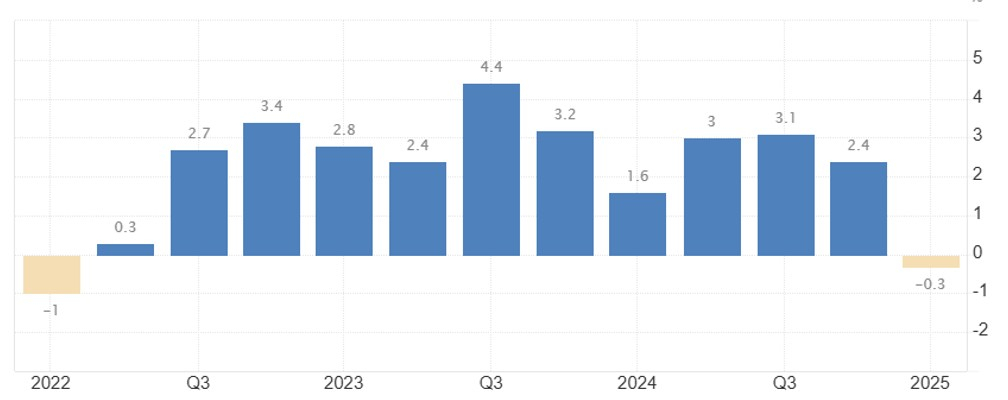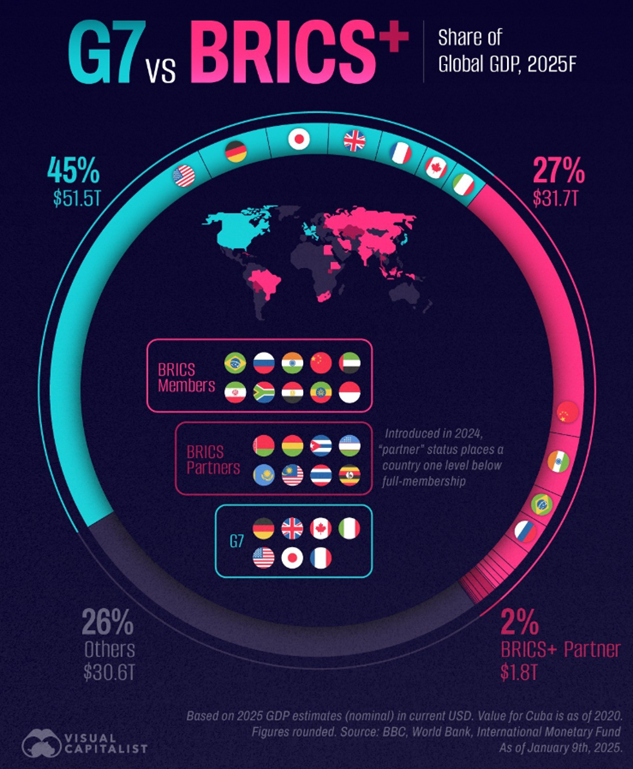For years, the United States has been the beacon of the global economy, an exceptional market, and an inexhaustible source of financial strength and leadership. The dynamics of the last decade, marked by tax cuts and massive monetary stimulus, fueled robust growth and corporate profits that placed the
S&P 500
far above its European peers. The pillars of this exceptionalism seemed unshakable: growth, liquidity, and the rule of law.
However, today we are witnessing these foundations eroding at an alarming rate. What began under Donald Trump’s presidency as an ambitious "America First" agenda has degenerated into erratic policies that have damaged investor confidence. The arbitrary imposition of tariffs, threats to the independence of the
Federal Reserve
, and improvisation in foreign policy have injected unprecedented uncertainty. This situation has led to simultaneous declines in stocks, bonds, and the dollar, reflecting not only the end of an expansive cycle but a deep questioning of the country’s political, legal, and economic stability.
The latest warning signal comes from economic data. First-quarter
GDP
this year registered a contraction of -0.3%, significantly below expectations. This "cold shower" is accompanied by a simultaneous deterioration in consumption, employment, and growth, with inflation still high. A kind of "soft stagflation" that is reminiscent of episodes where monetary policy runs out of room for maneuver.

Consumer spending
, the traditional engine of the US economy, grew only 1.8% annualized compared to the previous 4%, a sharp deceleration suggesting that households are curbing spending due to uncertainty or loss of purchasing power. The labor market shows cracks, with a disappointing employment report. And inflation persists, with the GDP deflator at 3.7% quarterly and core PCE at 3.5%, both well above the Fed’s 2% target.
This combination of economic stagnation and high inflation weakens expectations for corporate profits. If consumption slows down, companies sell less; if employment cools, there is less disposable income; if costs remain high, margins erode. This impacts both discretionary consumption sectors and technology, which is affected by slower growth and high financing costs.
Confidence, both external and internal, is the real Achilles’ heel. International capital, previously attracted by US stability, is now seeking other destinations. But the deeper problem lies in the internal confidence of citizens.
Consumer expectations
are deteriorating, the personal savings rate is falling to historical lows, and debt pressure is increasing. This undermines the robust private consumption (almost 68% of US GDP) that has been the basis of its economic strength. Unlike Europeans, US citizens concentrate a large part of their savings in local financial assets, exposing them to any prolonged deterioration in the markets.
Since Donald Trump’s arrival in the White House, US assets have underperformed Europe and China. The S&P 500 and Nasdaq have fallen, bonds have weakened, and the dollar has lost ground. This strengthens the "Sell America" narrative. Investing in dollar-denominated assets no longer seems like a safe bet but a risky play.
In parallel, the world observes the rise of blocs like the BRICS. Although still lacking sufficient cohesion to act as a unified bloc and with internal fractures (such as the reform of the UN Security Council), their ambition to reconfigure the global order is clear. They frontal reject trade protectionism and defend free trade and WTO rules, with clear references to the United States and the Trump administration.
The expansion of the BRICS+ (with Egypt, UAE, Ethiopia, Iran, Indonesia, Cuba, Bolivia, among others) gives them significant economic weight. In terms of Purchasing Power Parity (PPP), the BRICS+ already surpass the G7, reflecting their demographic weight and potential as engines of global consumption. Although the G7 leads in nominal GDP, the growing influence of the BRICS cannot be ignored. They seek greater representation in global institutions, which could change the balance of power in the coming years.
 On the geopolitical chessboard, a silent battle is being fought for dominance over critical minerals or "rare earths." Essential for technology, defense, and energy transition, these 17 elements are now the new key to the world economy, and China continues to hold it firmly. Beijing secured its dominance in the value chain decades ago and uses these minerals as a weapon of economic pressure, as demonstrated by vetoing exports to Japan in 2010 and reacting to US sanctions in 2023 and 2025.
On the geopolitical chessboard, a silent battle is being fought for dominance over critical minerals or "rare earths." Essential for technology, defense, and energy transition, these 17 elements are now the new key to the world economy, and China continues to hold it firmly. Beijing secured its dominance in the value chain decades ago and uses these minerals as a weapon of economic pressure, as demonstrated by vetoing exports to Japan in 2010 and reacting to US sanctions in 2023 and 2025.
The United States and Europe are trying to regain ground. The US seeks to strengthen its domestic industry and bilateral agreements, while Europe signs diplomatic agreements with supplier countries, albeit with risks due to instability and corruption. China advances unchecked, while Europe advocates for sustainable paths and the US prioritizes strategic access. Dependence on China for processed and refined minerals risks the ecological transition and Western technological development. An interruption could paralyze entire sectors and compromise industrial sovereignty. This "mineral diplomacy" is a matter of economic and political survival.
Paradoxically, some argue that the clumsiness of the US strategy under Trump is benefiting adversaries like Xi Jinping. By confronting allies and adversaries alike, the image of questionable regimes is whitewashed. Beyond trade, the international order and democratic values are at stake. Regimes like China’s, autocracies seeking to replace Western leadership, find in Trump’s actions (his disregard for institutions, attacks on the press, questioning of election results and judicial decisions) behavior that resembles their own, normalizing this type of leadership.
Instead of strengthening alliances with democratic countries that concentrate more than half of world consumption, Trump’s indiscriminate tariff policy punishes his allies, weakening the bloc that should be his main support. Instead of isolating Beijing, Trump is isolating Washington. He fails to capitalize on China’s internal economic weaknesses, giving them arguments for aggressive stimulus policies and inflicting self-punishment economically. Trump’s strategy not only fuels the Chinese expansionist project but also legitimizes, in the eyes of many, a regime that should be seen as a threat to freedom. Xi Jinping doesn’t need to do much; it’s enough for Trump to keep making mistakes.
Finally, even within the US, the financial landscape shows signs of decentralization. While New York remains the epicenter, Texas is emerging as a challenge. The New York Stock Exchange opened a branch in Dallas, and a new exchange, the Texas Stock Exchange (TXSE), has raised significant funds and is seeking regulatory approval to operate soon. Texas attracts companies and investors due to its favorable tax climate, less regulation, and lower costs. It is home to more Fortune 500 companies and seeks to be the home for "hard tech" companies and industrial SMEs with more accessible IPOs. This shows how other regions can become innovation hubs if they offer the right environment, a valuable lesson for other parts of the world, like Europe, which still rely too much on a few economic centers. Competition between exchanges also highlights the need to reduce bureaucracy to facilitate IPOs.
American exceptionalism is being undermined simultaneously from the outside by global challenges and from within by economic fragility and the erosion of confidence. The loss of international confidence in its assets and the increasing vulnerability of the domestic consumer create an explosive combination. Recovering confidence requires restoring institutional credibility and consolidating responsible policies. Meanwhile, the global landscape is being reconfigured, with emerging blocs gaining weight and silent geopolitical battles defining control of strategic resources. In this complex context, the divergence between expectations and economic reality increases the risk of market corrections. We are witnessing not just an adjustment, but possibly the beginning of a deeper shift in the global balance of power.
